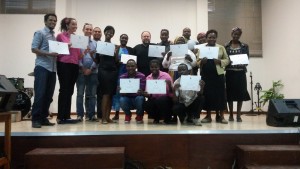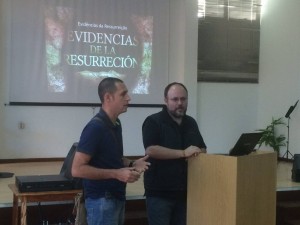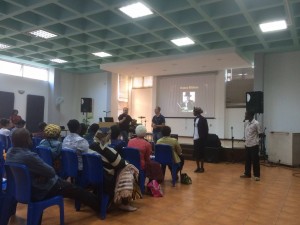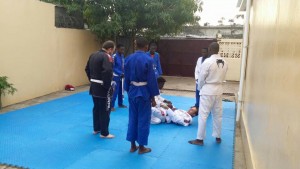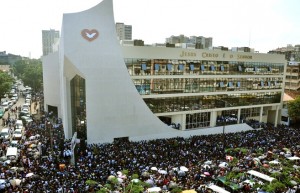
I just returned from a one-week mission trip to Mozambique, South-East Africa. This trip has impacted me in ways that I will attempt to describe here with the hope that it may change you also, even if just in a small measure, and compel you to think about world-evangelism.
I was part of a team of 18 people from my church, Champion Forest Baptist Church, in Texas to visit the capital of Mozambique: Maputo. Our leader, Pastor Esteban Vazquez told us at the beginning of the trip that we would be changed after this experience. I underestimated to what extent.
My set goal was to teach about the historical evidence of the Resurrection of Jesus using the minimal facts approach, developed by Dr. Gary Habermas—whom I had the honor to have as lecturing professor in 2013. Katya, my dear wife, led worship/teaching at different churches and imparted workshops about the use of art in church. Another team focused their efforts at an orphanage, teaching music and sound, etc.
On Day 1, we met a wonderful man. Pastor Francisco Vieira is on the front lines of evangelism in the capital of Mozambique: Maputo. He lives with his wife Claudia and small children (Joao and Tamara). With a contagious smile, and a friendly personality he intends to continue to win Africa for Christ, one step at the time (as he has done for the last five years). That is the motto of his organization: “Caminha Africa” or “Walk Africa.”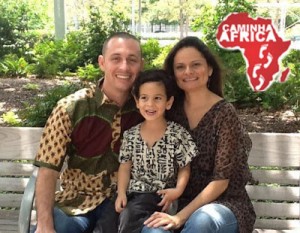
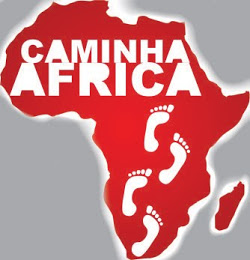
There are many challenges faced by missionaries like Francisco in Mozambique. Mozambique got its independence in 1975 and a subsequent civil war (1977-1992) left the country in ruins. Most of the population is Muslim or Roman Catholic. The rest is Evangelical/Protestant/Pentecostal. Here the issue is that true Christianity is quite rare. The country’s Catholicism has morphed and mixed with local mysticism and witchcraft. The Universal Church of the Kingdom of God[1] (founded by the millionaire Edir Macedo) is very popular in Mozambique but unfortunately it is hardly a Christian denomination but a cult that promotes the prosperity gospel. Add to these issues the fact that corruption is rampant, true democracy is inexistent, more than 10% of the population is infected with the HIV (ranks #5 in the world), malaria outbreaks are routine, kidnappings of foreigners for ransom, severe droughts, etc, etc,. The list is just overwhelming…
Yet, there are those obedient to the Cross of Christ to go to these places to meet the physical and spiritual needs of the African people—forsaking their own comfort—but most of all, to bring the true Gospel to the lost.
Pastor Francisco’s strategy is to reach the Mozambican people through his newly founded Baptist Church and eventually with a school where he can educate the future pastors and theologians of Maputo.
This is the middle in which my wife and I spend a “mission week.” First of all, let me clarify something I heard from my friend, Pastor Esteban Vazquez.
Those of us living relatively comfortable lives in America and visit Africa for a week are not missionaries. We don’t deserve that honor.
As I mentioned, I delivered three sessions of the Evidence for the Resurrection of Jesus at a local church and at the Maputo Theological Seminary. What I encountered was not something I could imagine. The students were eager, thirsty, and attentive. Their eyes sparkled as I delivered the evidence. They were like sponges for the knowledge of Christ. And they were brilliant! One of them, Catarina, is a medical doctor; another lady is in charge of Child Nutrition Services for the Mozambican government; there was a single mother of 4—an orphanage administrator—who took a “Chapa”—a local van in which people have to literally fight for a cramped space—for over an hour and a half to attend the class.  And the list goes on. In fact, the single-mother of 4 just told me that last night there was a strong wind that blew away the laminated roof of her house. She and her kids are safe, but this is what life is like for most of the African people. These were my students.
And the list goes on. In fact, the single-mother of 4 just told me that last night there was a strong wind that blew away the laminated roof of her house. She and her kids are safe, but this is what life is like for most of the African people. These were my students.
There I was in front of them with Pastor Francisco as my translator, thinking I was going to teach them much-needed information about the resurrection. But as the days progressed, something in me started to change. It is hard for me to describe it, but I started to see the Mozambican people under a different light. They stopped being my “students” to become what C. S. Lewis called “immortals.” The roles switched. I became the learner:
“There are no ordinary people.” wrote C. S. Lewis, “You have never talked to a mere mortal. Nations, cultures, arts, civilization—these are mortal, and their life is to ours as the life of a gnat. But it is immortals whom we joke with, work with, marry, snub, and exploit—immortal horrors or everlasting splendours.”
As I got to know the Mozambicans, I found myself agreeing with Lewis even further:
“the dullest and most uninteresting person you talk to may one day be a creature which, if you saw it now, you would strongly be tempted to worship, or else a horror and a corruption such that you now meet, if at all, only in a nightmare. All day long we are, in some degree, helping each other to one or other of these destinations….”
To be a missionary, an evangelist, a true Christian, we need to see our fellow men as potential everlasting splendors. It is my hope and my prayer, that the people I interacted with were drawn towards becoming everlasting splendors with the knowledge of the resurrection. In turn, I learned much from them. I learned…
…that it takes very little to be content and to have a smile on your face.
…that we have become slaves of our desires as we desire evermore.
…that we are at risk of losing the true gospel of Jesus Christ as we replace it with a cheap version of the prosperity gospel: devoid of the suffering cross and the hope of Eternal Life.
…that worship is a matter of the heart. Not a matter of voice, instruments, or even music.
…that I am not a missionary. I don’t deserve the honor to be called that.
…that the language of love and Christ is universal.
…the hug from a Christian Mozambican is the sincerest form of appreciation I have felt in a long time.
…that Mozambican children have the most contagious and sincere of laughers.
…that those who will be given the most precious crowns in heaven are not necessarily those Christians belonging to big churches, or popular Christian singers, or the best public speakers, or those with the best doctrine. Those with the biggest crowns in heaven will be the nameless Christians willing to give up everything, including their very lives, to the cause of Christ.
…that I have yet much to learn.
…that I have yet much to let go of.
…that I have yet much to do.
When I embarked in this adventure a week ago, I thought I was going to change Africa, at least in a small way. When my week there was over, I realized I had it all wrong: Africa had changed me…
—How can you Help?
- Pray for the missionaries and local Pastors such as Pastor Francisco and their families.
- Encourage them.
- Give financially. You’d be surprised how much even a small monthly contribution can help.
—-Some of our key moments in Africa:
The Resurrection class after receiving their certificates of completion.
Me and Pastor Francisco providing an introduction to the minimal facts approach to the resurrection.
To explain the early timing of the Creed in 1 Corinthians 15:3, I did a human timeline just as Dr. Gary Habermas usually does.
Pastor Francisco uses Brazilian Jiu-Jitsu (devoid of Eastern philosophy) to reach the local children and youth in his community. That’s me in the black uniform.
This was a special meal for the children of the orphanage in Machava: Two small fried fish, rice and salad.
Classroom in the orphanage.
Entrance to the theological Seminary in Maputo.
This is the largest denomination in Maputo: The Universal Church. Unfortunately it is a cult of the Prosperity Gospel.
Sunset in Maputo during our last day. View from the Second floor of the Theological Seminary.
[1] Controverial movement, based in Brazil. The movement also uses the name ”Stop Suffering.” Promotes word-faith teachings, with a particular emphasis on the seed-faith doctrine. Since its theology and practices are far outside those of normal, biblical Christianity, this movement is considered to be a cult of Christianity.



